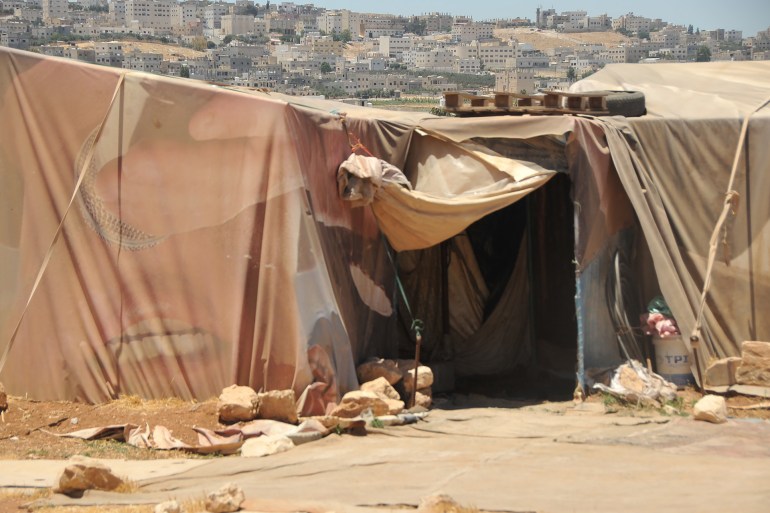She walks with her six children every morning for 5 kilometers back and forth, collecting the fallen vegetables from the boxes while they are being transported in the central vegetable market east of the capital Amman, to return to her tent in the evening loaded with what she and her children have picked.
Syrian refugee Umm Tariq Al-Homsi, 53, mixes what she collected of vegetables with what she has leftover food parcels and canned goods, which she obtained from the World Food Program for Syrian refugees, for food with her and her family in the evening before bed, and in the morning before going to work again.
She heard from her neighbors in the neighboring tents that the food aid would stop, and when she checked her mobile phone, she was surprised to receive a message informing her that she and her family are among the 21,000 refugees whose food aid will be stopped starting next month.
The United Nations World Food Program announced last week that 21,000 refugees will not receive their monthly food aid as of next July, due to a lack of funding that has forced the program to prioritize the neediest refugees.
The refugees started austerity measures in preparation for the implementation of the decision to stop aid for them (Al Jazeera Net)
reduce meals
In anticipation of the frightening coming, Umm Tariq begins an emergency plan that includes a set of austerity measures, beginning with reducing meals for seven family members who support them after her husband, who was killed in Syrian prisons years ago, left them.
Umm Tariq told Al Jazeera Net, "If the food aid stops, we will be more hungry than we will be hungry, and I will have to reduce meals and be satisfied with eating the vegetables that we collect from the Hesba raw."
The widowed woman receives food aid in the form of cash transfers of 105 dinars per month ($148) for her family, with which she buys food, medicine, cleaning materials and the needs of her family in their plastic tent and tin boards that they shelter in east of the capital, Amman.
Um Tariq’s condition is almost better than that of her neighbor, Rashid al-Mamouni (48 years old). After he contracted a terminal illness that forced him to bed, his sons began working in blacksmithing workshops and pulling wagons carrying vegetables in the central market.
Al-Mamouni told Al-Jazeera Net, "I was informed of the suspension of the monthly support payment on the pretext that we do not need, and this matter will exacerbate our suffering. I need a monthly treatment of more than 70 dinars (100 dollars), and with what we receive we live a life of hunger, so what will happen to us after stopping it?"
He spends the monthly cash assistance he receives from the World Food Program on his necessary medicines, and he and his family live for the rest of the month with a few dinars that his children collect from their work, he said.
world food program crisis
The suffering of Syrian refugees is a symptom of a severe funding shortfall that the World Food Program suffers from in Jordan, where it urgently needs $58 million to continue providing food aid to half a million refugees until the end of the year, according to the program’s management, and if funding is not available, the program will have to To stop aid for a quarter of a million refugees in Jordan.
The cash assistance provided by the World Food Program constitutes a lifeline for refugee families residing in the Zaatari and Azraq camps. The program provides monthly assistance of 23 dinars ($32) per person, while refugees residing outside the camps who are classified as vulnerable receive a monthly assistance of 15 dinars. ($21) per person.
The decision to stop aid came at a difficult time for the refugees, as many of them lost their jobs (Al Jazeera Net)
Unemployment and stopping aid
The decisions of the World Food Program to stop the monthly cash assistance comes at the worst time for refugee families who are struggling to earn money, while many of them have lost their jobs due to the Corona pandemic, and the work they work in has stopped, according to specialists.
According to the assessments of the World Food Program, the number of refugees in Jordan who suffer from food insecurity has doubled during the past year 2020, to reach 25%, compared to 13% in 2019 before the emergence of the Corona pandemic, which is 64% of the refugees On the brink of food insecurity.
The World Food Program spokeswoman in Jordan, Dara Al-Masry, said that stopping cash assistance for 21,000 refugees who live outside the camps helps prioritize the "most needy" families, and that the suspension will start working on July 7, 2021.
Refugees in the central vegetable market area, east of the Jordanian capital, Amman, complained of their poor conditions (Al-Jazeera Net)
She continued to Al Jazeera Net that these decisions "were not easy, and we have great concern for 4,400 refugee families who have been cut off from aid," and despite their dire need for food assistance, the program "does not have sufficient funding to provide food assistance to this number of refugees."
The assistance provided by the program constitutes the main source of income for 83% of the refugee families who benefit from it, and their number is estimated at 527,000 refugees, and the percentage of those whose aid will be cut represents 4% of the number of refugees benefiting from the program.
Since refugee families benefiting from the program are the most needy group, their members resort to negative food-based consumption strategies, such as limiting the number of meals, borrowing food and relying on lower quality and less expensive food.
In addition, some families take their children out of schools and deprive them of education and send them to work, sometimes even begging, to find a source of income to meet their daily needs.

